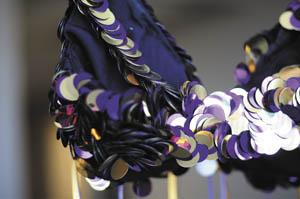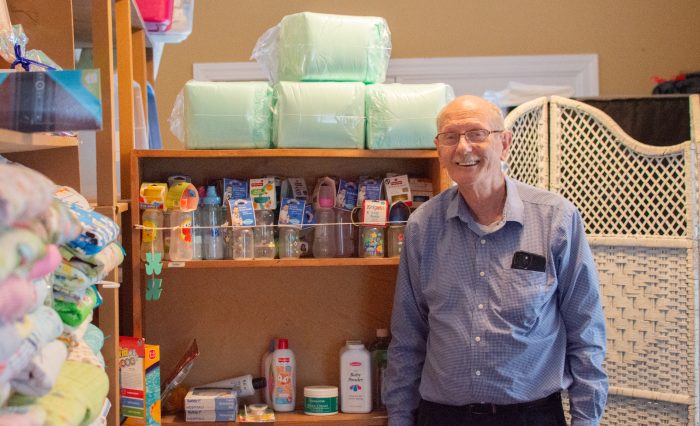Events to promote awareness, urge self-breast exams and other steps
Published 12:00 am Saturday, October 1, 2011

- Miranda Pederson/Daily NewsArea artists are designing bras for the American Cancer Society's Bustin Out breast cancer awareness campaign.
hen Carol Wedge found out she had breast cancer after a routine mammogram and biopsy nearly four years ago, she was in complete shock.
“I thought I was doing everything possible to have a very healthy life. I ate fruits and vegetables,” she said. “I exercised with a trainer. There was no history of breast cancer in my family except a first cousin.”
Trending
The Bowling Green woman said her reaction wasn’t unusual. She has seen it on the faces of women she helps as a volunteer for the American Cancer Society Reach to Recovery Program. Volunteers – whom the ACS matches with patients – do a variety of things, from being a sounding board for patients and their families to talking about their own experiences so patients know what to expect.
“Just about every woman who was diagnosed will say it was a shock, even if you expect something,” Wedge said. “It’s just the word cancer in your body is a shock. You want it removed yesterday.”
During October, which is recognized as Breast Cancer Awareness Month, the American Cancer Society and Kentucky Cancer Program are encouraging women to do self-breast exams, talk to their physicians about screening and follow screening guidelines in order to detect cancer as early as possible.
“We want to encourage women to … remember that it’s important to detect breast cancer early and, aside from their screenings, if they should notice any symptoms – lumps, changes in their breasts or nipples or the contours of the breast – make sure they get that checked out,” KCP cancer control specialist Elizabeth Westbrook said.
ACS Health Initiatives Representative Tammy Tinsley agreed. She said women should check themselves with self-breast exams starting at age 20 and know if there is any history of breast cancer in the family.
“Breast cancer is the most common cancer that women may face in their lifetime. It can occur at any age but most often occurs after the age of 40,” she said. “The best defense is to find cancer as early as possible. When it’s small and hasn’t spread yet, it’s easier to treat.”
Trending
ACS will have a couple of events to promote awareness. The organization put up a Bra-morial on Friday of new and gently used bras outside Western Kentucky Diagnostic Imaging as part of the community breast cancer awareness promotion Bustin’ Out.
“Each bra represents a person diagnosed with breast cancer in the state of Kentucky,” Tinsley said. “The number of women diagnosed in Kentucky is 2,000 in one year’s time.”
The display leads up to the grand finale celebration, which will be at 6:30 p.m. Oct. 28 at the Sloan Convention Center. Tickets, which can be bought in advance or at the door, are $40. The event will include a sit-down dinner, a live band and a silent auction of commissioned bras created by artists, crafters and celebrities. To purchase tickets, call 782-9036.
The KCP is helping Girl Scouts learn about breast cancer. Last year, Girl Scouts of Kentuckiana participated in a breast cancer awareness patch program during the Sun Belt Conference cross-country championship races at Kereiakes Park. The groups will do a similar event Oct. 29. The scouts – ages 6-13 – will make cards for cancer survivors, celebrate the birthday of Girl Scouts founder Juliette Low, who died of breast cancer in 1927, and learn about the importance of exercise in cancer prevention. The girls will also earn a patch for participating.
“Last year 85 participated,” Westbrook said. “This year, we will hopefully add more.”
In fact, Westbrook hopes some breast cancer survivors come to help with the event. For volunteer information, call the KCP office at 842-0950.
“We want to get some breast cancer survivors to come out and be involved with it to show the girls that a diagnosis of breast cancer does not mean that you’re always sick,” she said. “Yes, you may have to have treatment or go through a period of time when you feel badly, but they’re active in the community and work.”
During Wedge’s battle with breast cancer, she had surgery in January 2008 to remove both breasts.
“The type I had would spread to the other breast 50 percent of the time. I didn’t want to worry about having cancer in the other breast the rest of my life,” she said. “I’m so glad that I made that choice because it was in my lymph nodes. That was even a shock to my doctors.”
That March, she started chemotherapy. Wedge participated in a clinical study for a brief time, but the chemo was too strong and made her sick. She had to let her body rest before starting regular chemo treatments and, later, radiation. She made a conscious decision to make her chemo treatments special.
“When you go for chemo, you see some very sad people, some very sick people. I decided I would dress up when I went to chemo,” she said. “I would put on my brightest colors and my jewelry. I think the nurses enjoyed seeing someone coming in dressed up.”
Wedge also decided she would make those day “chemo days.” Instead, she and her husband, Denny, would add more activities to their itinerary during her treatments in Nashville.
“I’d drag him to Green Hills Mall,” she said, laughing. “We’d tour gardens and historical places and go to restaurants.”
Her husband was with her for every doctor’s visit and while she was in the hospital, Wedge said.
“Having such a loving husband, this was such a comfort,” she said. “Denny was with me every step of the way.”
Since having surgery, Wedge has felt great.
“I’ve had no problems whatsoever. I never allowed myself to believe I wouldn’t be restored to good health. I’m a positive person,” she said. “I felt this was a bump in the road of life. It turned out to be a bigger bump than I anticipated. I never doubted that I would not recover.”
Her favorite Bible verse is Proverbs 3:5-6 – “Trust in the Lord with all your heart and lean not on your own understanding; in all your ways submit to him, and he will make your paths straight.” Inside a cabinet door in her kitchen reads a sign that says “I am too blessed to be stressed and too anointed to be disappointed.”
“I read that a lot,” she said. “I believe God has given me a spirit that I won’t be a slave to fear.”
Wedge said she is happy to be a Reach to Recovery volunteer.
“It helps so much to talk to someone who has gone through the same type of surgery or chemo that you’re experiencing,” she said. “I didn’t have a volunteer of my own, but I had numerous friends who had gone through this. They were such a source of strength to me.”
Wedge tries to make sure the people she is helping are comfortable so they can feel free to ask her about anything. She said some of the things she learned through experience include where to find a good wig, that hair loss means losing it all over the body and how to choose a good oncologist.
“You have got to have someone you have a world of confidence in,” she said. “You are going to have a lifetime relationship with this person.”
Tinsley said she is grateful for the Reach to Recovery volunteers.
“Without our volunteers, the Reach to Recovery Program would not be possible,” she said. We’re always looking for new volunteers and would like to say thank you to the great volunteers we already have.”
Wedge said she has learned to appreciate life so much more through her battle with cancer.
“You don’t sweat the small things. You have a better appreciation for God, family and friends,” she said. “You can get through it, and life will be even better afterwards.”






